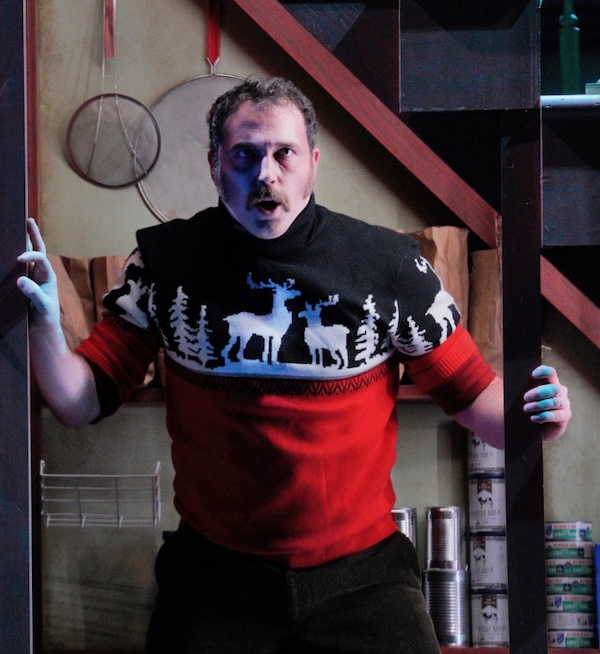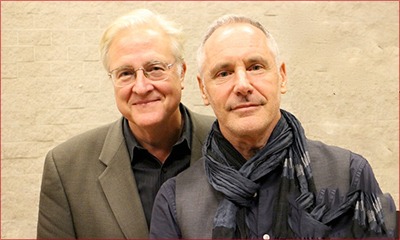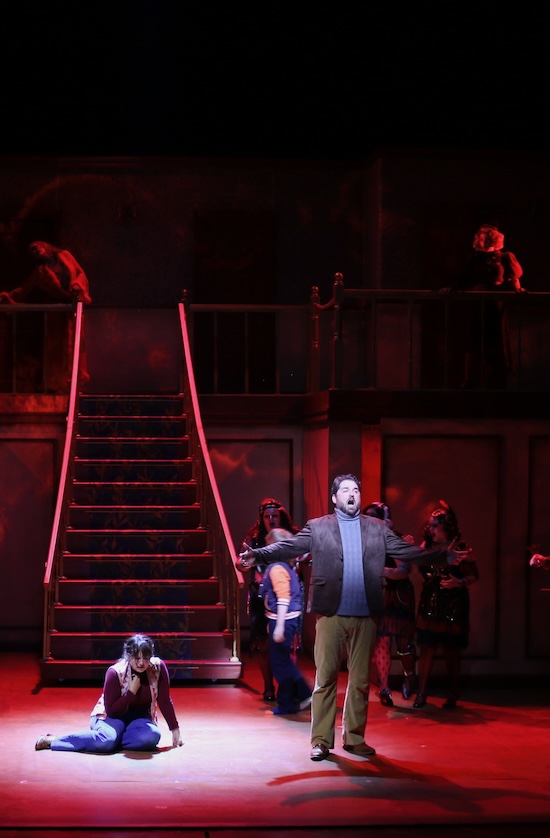October 08, 2025
By Katherine Buzard

In their adaptation of Stephen King’s iconic 1977 novel The Shining, composer Paul Moravec and librettist Mark Campbell have struck operatic gold.
Since its 2016 premiere as part of Minnesota Opera’s New Works Initiative, the opera has seen repeat productions across the country, selling out theaters and even prompting the addition of extra shows in its 2023 run at the Atlanta Opera—something virtually unheard of in the current arts landscape.
The Shining opens at Utah Opera Saturday night in a co-production with Opera Parallèle, Hawaii Opera Theatre, and Portland Opera, directed and designed by Brian Staufenbiel.
Moravec, Campbell, and baritone Craig Irvin, who sings the central role of Jack Torrance in this production spoke to Utah Arts Review to provide insights about the work’s success and the upcoming Salt Lake City production.
Name recognition is a major factor in filling theater seats, even if most audiences will be more familiar with Stanley Kubrick’s 1980 film than the original novel on which the opera is based. The idea to adapt King’s psychological thriller for the opera stage was suggested by Minnesota Opera’s then-artistic director Dale Johnson and stage director Eric Simonson. They approached Pulitzer Prize-winning composer Paul Moravec, who brought the idea to librettist Mark Campbell (also a Pulitzer Prize winner for Kevin Puts’s Silent Night).
Both Campbell and Moravec were familiar with Kubrick’s film, but neither had read the book. Initially hesitant, they were ultimately convinced by the idea after reading King’s novel, which differs from the film in significant ways, beyond iconic elements that were inventions of the film—such as the bleeding elevator, the twin girls, and “Here’s Johnny!”
More significantly, Moravec said he finds the film “icy and cold and rather cynical,” whereas the book is “actually very warm.” In fact—spoiler alert—the book ends in fire rather than ice, with Jack dying from the boiler explosion rather than freezing to death.
But the book is figuratively warmer as well, its characters painted with more depth and humanity. This is what makes the novel “very operatic” in Campbell’s view. “I think the movie’s really incredible, but you don’t care about the characters, and in opera you need to care,” he continued. “The novel is a very human story about a family that’s grappling with the father’s growing insanity in a remote place, and it’s very much about love.”
Moravec also considers The Shining to be a love story in the end. “It’s about love,” he said. “It’s about death. It’s about power. But most of all, it’s about love. And you need something with heart in it to write an opera, in my view.”

The book also gives deeper insight into the reasons behind Jack Torrance’s descent into madness. This psychological arc lends itself well to operatic treatment, the “mad scene” a well-worn operatic device. Moravec looked to Sweeney Todd and Wozzeck as models for capturing Jack’s psychological journey in music. Notably, as Jack loses his grip on reality, the score’s harmonic language shifts to signal Jack’s worsening mental state.
“The music starts out essentially tonal,” Moravec explained. “In a sense, that represents normalcy, happiness, or at least being adjusted to reality. As the opera progresses and as Jack loses his hold on reality, the musical language starts to disintegrate. By the middle of the second act, he’s actually singing atonal music. He’s become harmonically unhinged and unmoored.”
In addition to the conflicting tonal worlds, each character has their own musical language and leitmotifs, which combine and evolve over the course of the opera. For instance, a four-note motive denoting “the shining”—Danny Torrance’s psychic ability to perceive spirits and events before and after they have happened—recurs throughout the opera whenever this power is mentioned.
“The way that leitmotifs work in The Shining is really subliminal,” Moravec explained. “In other words, you may be aware of what I’m doing in transforming the themes and so on, but the real power of the leitmotif is that it works subliminally. It works directly on the central nervous system in a way that the audience may not be aware of.”
The hope is that audiences forget they are watching an opera and lose themselves in the story. This has proven especially important for The Shining, as name recognition alone has brought in many first-time opera-goers who may be skeptical about the art form and need some coaxing to suspend their disbelief. And it seems to have worked. “Once we bring them in, they just go with it,” Moravec said. “They understand that this is a completely different medium. It’s not the movie. It’s not the book. It’s an opera.”
Moravec recalled how the audience on opening night spontaneously reacted to Wendy’s central aria in which she sings of her love for Jack. In composing the scene, he said he wanted it to be akin to “Vissi d’arte”—Tosca’s show-stopping Act II aria where the audience can’t help but applaud. “And on opening night, they did,” Moravec recounted. “She finished her aria and they just went bananas . . . What’s interesting is so many of the people in the audience had never been to an opera. They didn’t know any of the conventions—they just reacted.”
Although it may seem an unconventional choice in comparison to La Bohème, for example, baritone Craig Irvin believes “It’s a wonderful first opera.”
Irvin sang the role of Jack in the 2023 Atlanta Opera production, which he will reprise at Utah Opera this month, his sixth appearance at the company. “It won’t necessarily be anything like your second opera, but it’s a wonderful way to experience the art form for the first time.”

Having performed the role 12 times already at Atlanta Opera, Irvin knows how to pace himself vocally and dramatically to get through the opera. While learning the atonal music at the height of Jack’s madness proved challenging, going through the psychological arc night after night is harder.
“The emotional journey that the character of Jack takes is exhausting” Irvin said. “It starts out very lovingly and very sweet between the characters . . . then the hotel starts to eat away at the humanity within Jack and corrupt him, trying to get him to kill his wife and son so the hotel can get the power the son has.
“If you don’t believe that Jack truly loves his wife and son at the beginning, the journey means nothing and the sacrifice at the end means nothing. So, the hardest part for me is going through that arc of the character and doing it without running out of energy three quarters of the way through.”
Unlike the film, the opera ends on a cathartic note. The epilogue takes place at a hotel in Maine, where Wendy and Danny encounter the former chef of The Overlook Hotel, Dick Hallorann. In the scene, Hallorann tells Danny to remember that his dad loved him and assures him that everything will be okay. After the fierce atonality of Jack’s delirium and the catastrophe at The Overlook, Hallorann’s tonal aria restores harmonic balance and leaves the audience refreshed.
Even though he is not on stage for it, the epilogue is Irvin’s favorite part of the opera. “Hallorann gets to sing this beautiful, really cathartic aria at the end of the piece,” he said. “But by that point, I’m off stage, exhausted from going through the show. I’ve got this 15-minute scene where I’m just getting ready for the curtain call. In Atlanta, I watched that scene every show . . . It almost makes me cry when I’m standing there exhausted after singing the show.”
The Shining was Moravec and Campbell’s first collaboration, but it kickstarted a flourishing creative partnership. They have since worked together on three oratorios and a handful of songs.
While this is Paul Moravec’s first opera to be performed at Utah Opera, it is Campbell’s third, preceded by Silent Night (2020) and The (R)evolution of Steve Jobs (2023).
Utah Opera has been a champion of contemporary American opera, co-commissioning Ricky Ian Gordon’s The Grapes of Wrath in 2007, commissioning a set of four short operas in 2018/19 as part of its 10-Minute Opera Project, and staging operas by Jake Heggie, Kevin Puts, Jonathan Dove, and Mason Bates in recent years.
“I just want to express my appreciation for this company that is bringing contemporary opera to their audiences,” Campbell expressed. “I really love working with them. They’re trying to make opera not just this old European art form, but stories that Americans can tell about our lives now.”
The Shining opens Saturday night at Utah Opera and runs through October 19 at the Janet Quinney Lawson Capitol Theatre. utahopera.org
https://theclassicalreview.com/2025/10/opera-creators-find-the-light-of-love-amid-the-horror-of-the-shining/